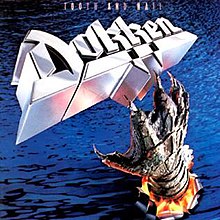Tooth and Nail (Dokken album)
| Tooth and Nail | ||||
|---|---|---|---|---|
 |
||||
| Studio album by Dokken | ||||
| Released | September 14, 1984 | |||
| Recorded | April–August 1984 | |||
| Studio | Cherokee Studios, Hollywood, California | |||
| Genre | Heavy metal, glam metal | |||
| Length | 38:11 | |||
| Label | Elektra | |||
| Producer | Tom Werman, Roy Thomas Baker | |||
| Dokken chronology | ||||
|
||||
| Singles from Tooth and Nail | ||||
|
||||
| Professional ratings | |
|---|---|
| Review scores | |
| Source | Rating |
| AllMusic | |
| The Collector's Guide to Heavy Metal | 8/10 |
Tooth and Nail is the second studio album by American heavy metal band Dokken, released on September 13, 1984 through Elektra Records. After the unsuccessful release of the band's debut album in the US, the record label was reluctant to give credit to Dokken for a follow-up. Dokken's management struggled to convince the label's executives to give the band another chance and this fight for recognition is reflected in the album's title. This album was the group's first with bassist Jeff Pilson following Juan Croucier's departure to join Ratt.
The production of the album was entrusted to renowned producer Tom Werman, but the recordings were hampered by the clash of egos between vocalist Don Dokken and guitarist George Lynch, who could not work together in a studio at the same time, and by the excesses of musicians and technicians. For these reasons, Werman was unable to carry on his work and quit the job after a few weeks, replaced by Roy Thomas Baker and Michael Wagner, who completed the recordings and mixed the album. The music of the album ranges from fast and aggressive tracks to pop and melodic ballads, representing a transition from classic heavy metal to the more commercial glam metal.
Tooth and Nail received positive reviews but was a slow seller, reaching the peak of No. 49 on the US Billboard 200 album chart and Gold status more than ten months after its release, on the wake of the success of the single "Alone Again" and of its accompanying music video. The album was certified Platinum by the RIAA in 1989, after both Under Lock and Key (1985) and Back for the Attack (1987) had achieved such status.
...
Wikipedia
